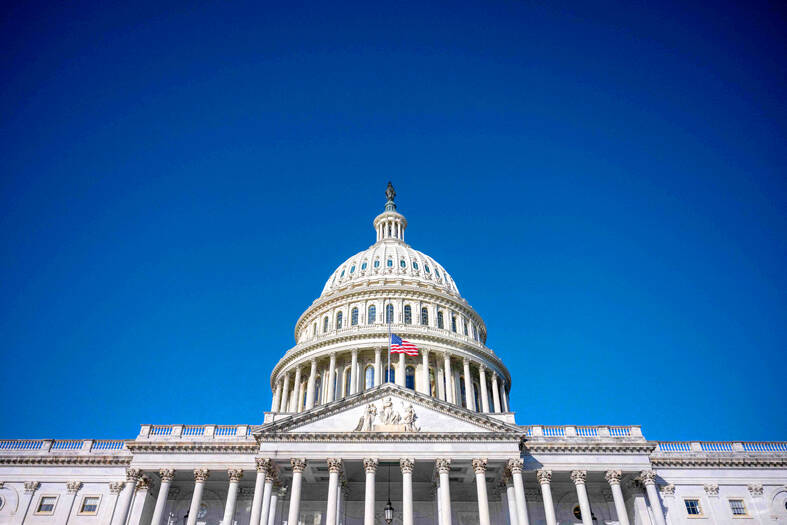Members of the US House of Representatives on Tuesday reintroduced a bill to support Taiwan’s international space and counter coercion by the Chinese Communist Party (CCP).
The Taiwan Allies Fund Act was reintroduced by US Representative Raja Krishnamoorthi, ranking member of the Select Committee on the Strategic Competition Between the US and the CCP, and other representative from across party lines, including John Moolenaar, Gregory Meeks and Ted Lieu (劉雲平), the committee said in a statement.
A companion bill in the US Senate is being led by US senators Chris van Hollen, John Curtis and Andy Kim.

Photo: AFP
Krishnamoorthi late last month announced his intention to reintroduce the bill, which would authorize US$120 million from next year to 2028 to provide assistance to Taiwan’s official and unofficial partners subjected to coercion and pressure from the CCP.
The appropriations would be for use in countries that meet criteria, including those that “maintain official relations with Taiwan or have meaningfully strengthened unofficial relations with Taiwan” and “have been subject to coercion or pressure by the People’s Republic of China [PRC] due to their relations with Taiwan.”
A country that qualifies for the funding may not receive more than US$5 million during any fiscal year, the bill says.
The money would be to support activities such as building “the capacity and resilience of civil society, media and other non-governmental organizations in countering the influence and propaganda of the PRC,” it says.
To maximize cost efficiency and eliminate duplication, the bill says that the US secretary of state should work with the director of the American Institute in Taiwan to ensure coordination with parties in Taiwan.
“China wants the world to turn a blind eye to its nefarious ambitions with Taiwan,” Curtis was quoted as saying in the statement.
“We cannot allow nations to fall prey to China’s pressure campaigns, which is why we’ve introduced bipartisan legislation to counter China’s attempts to silence Taiwan’s allies,” he said.
“Our bill helps countries stand strong in the face of the CCP and strengthen their ties with Taiwan,” he said.
The Taiwan Allies Fund Act was cosponsored by Krishnamoorthi last year, but it was not enacted after stalling in the Senate.

Taiwan is projected to lose a working-age population of about 6.67 million people in two waves of retirement in the coming years, as the nation confronts accelerating demographic decline and a shortage of younger workers to take their place, the Ministry of the Interior said. Taiwan experienced its largest baby boom between 1958 and 1966, when the population grew by 3.78 million, followed by a second surge of 2.89 million between 1976 and 1982, ministry data showed. In 2023, the first of those baby boom generations — those born in the late 1950s and early 1960s — began to enter retirement, triggering

ECONOMIC BOOST: Should the more than 23 million people eligible for the NT$10,000 handouts spend them the same way as in 2023, GDP could rise 0.5 percent, an official said Universal cash handouts of NT$10,000 (US$330) are to be disbursed late next month at the earliest — including to permanent residents and foreign residents married to Taiwanese — pending legislative approval, the Ministry of Finance said yesterday. The Executive Yuan yesterday approved the Special Act for Strengthening Economic, Social and National Security Resilience in Response to International Circumstances (因應國際情勢強化經濟社會及民生國安韌性特別條例). The NT$550 billion special budget includes NT$236 billion for the cash handouts, plus an additional NT$20 billion set aside as reserve funds, expected to be used to support industries. Handouts might begin one month after the bill is promulgated and would be completed within

The National Development Council (NDC) yesterday unveiled details of new regulations that ease restrictions on foreigners working or living in Taiwan, as part of a bid to attract skilled workers from abroad. The regulations, which could go into effect in the first quarter of next year, stem from amendments to the Act for the Recruitment and Employment of Foreign Professionals (外國專業人才延攬及僱用法) passed by lawmakers on Aug. 29. Students categorized as “overseas compatriots” would be allowed to stay and work in Taiwan in the two years after their graduation without obtaining additional permits, doing away with the evaluation process that is currently required,

IMPORTANT BACKER: China seeks to expel US influence from the Indo-Pacific region and supplant Washington as the global leader, MAC Minister Chiu Chui-cheng said China is preparing for war to seize Taiwan, Mainland Affairs Council (MAC) Minister Chiu Chui-cheng (邱垂正) said in Washington on Friday, warning that Taiwan’s fall would trigger a regional “domino effect” endangering US security. In a speech titled “Maintaining the Peaceful and Stable Status Quo Across the Taiwan Strait is in Line with the Shared Interests of Taiwan and the United States,” Chiu said Taiwan’s strategic importance is “closely tied” to US interests. Geopolitically, Taiwan sits in a “core position” in the first island chain — an arc stretching from Japan, through Taiwan and the Philippines, to Borneo, which is shared by